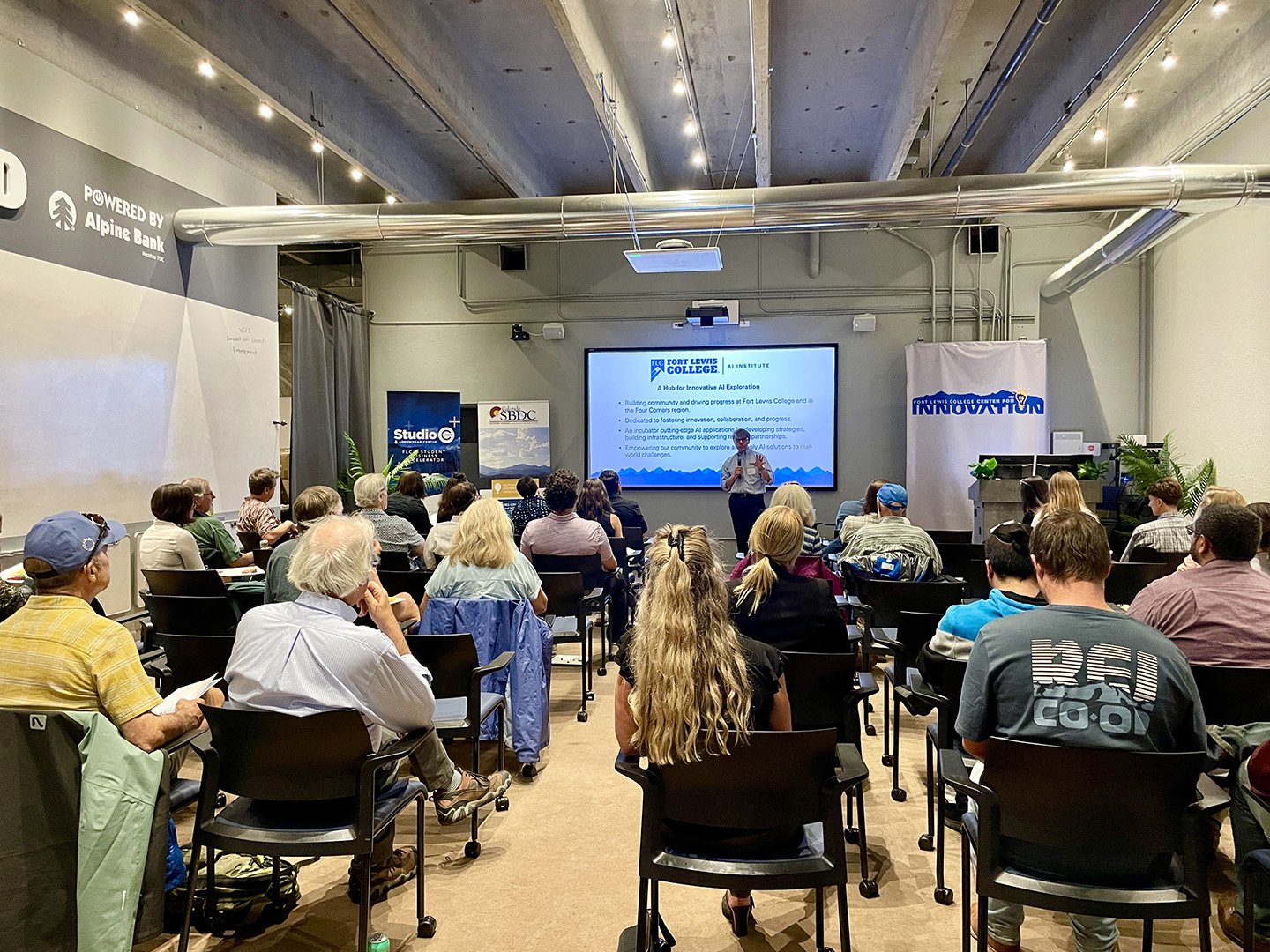
How are rural innovators using artificial intelligence to solve real problems and strengthen their work? That question anchored the Elevate AI Celebration, hosted by the AI Institute at Fort Lewis College, where four Elevate AI incubator funding recipients presented their projects. From expanding access to crisis support to improving marketing workflows and studying bias, each project demonstrated how AI can serve as a tool for impact—not just innovation—in rural communities like Durango.
Despite heavy rain throughout the evening, the event drew a strong crowd to the Center for Innovation in downtown Durango. Remarks from Mario Martinez, founder of the AI Institute and provost and vice president of Academic Affairs, and Tom Miaskiewicz, director of the AI Institute and Marketing and Katz Endowed Professor, opened the program. They welcomed attendees and recognized the full cohort of Elevate AI Incubator participants.
The showcase featured four presentations from full project proposal recipients:
Nicole Guthrie, manager of AI and analytics, moderated a panel discussion with the Elevate AI recipients following their presentations. Some discussed how the funding allowed them to try out AI tools and explore different solutions.
For McBrayer, the project offered her team the opportunity to try AI tools and content management systems to support storytelling. Being able to practice with and utilize new tools also allowed the Marketing & Communications team to be more intentional and thoughtful as they created guidelines for AI use in marketing and communications at FLC.
The panel also highlighted how support from the AI Institute provided through the incubator program helped with problem solving and choosing the best AI tool for their needs.
“I just knew there was a problem and that AI could help fix it,” said Christie. “And the team at the AI Institute helped me really set up my ideas to figure out what that looked like. I had a lot of big ideas…It’s okay to not know what you’re doing and ask for help. And it’s there.”
Panelists emphasized that AI can enhance work and lighten workloads, but it doesn’t replace people.
“It’s important to make sure you’re being assisted by AI and not just replacing people with AI. I think that's kind of the most important thing,” said Borgella. “At least in my lab, my students gravitated toward it because they knew that they had a role to play still.”
Latimer echoed that utilizing AI freed her up to connect with people and expanded what was possible for the organization.
“It’s really opened up so many doors for us in marketing, fundraising, and preparing content for presentations. And we’ve created avatars to represent victims, and videos, and so much content,” she said. “It’s like we’re on this journey of learning just because we’ve had this opportunity to engage with the institute.”
Junior AI analysts Blake Mister and Kelvin Benedict also took the stage to reflect on their hands-on roles supporting the projects throughout the semester.
Benedict, a senior Business Administration major, was able to expand his skill set working with AI. Working with DurangoTango on their project to connect students with local part-time work, he began using Cursor, an AI tool that assists developers with code generation through natural language prompts.
“I'd never designed a database. I'd never implemented a database, and Cursor has allowed me to do all that and learn so much along the way,” he said.
Mister, a senior majoring in Computer Information Systems, found his work on the incubator projects led him to envision a future career path with an AI focus.
“I think this definitely has made a tremendous impact on where I'm going to in the future. Just working with AI and working with the group, I've learned that I want to do something that is AI first, and where I'm able to utilize the tools, and make an impact for the people that I work with, teach them how to use AI, and also use it to be more efficient and put more work out there,” he said.
The evening closed with remarks from Miaskiewicz, who reaffirmed the AI Institute’s commitment to advancing ethical, applied AI that reflects the needs of the region. That commitment continues this year, with the Elevate AI incubator program opening a new round of applications on October 1, 2025.
The Elevate AI Celebration offered a glimpse into what’s possible when technology is guided by local expertise and when innovation stays rooted in community.